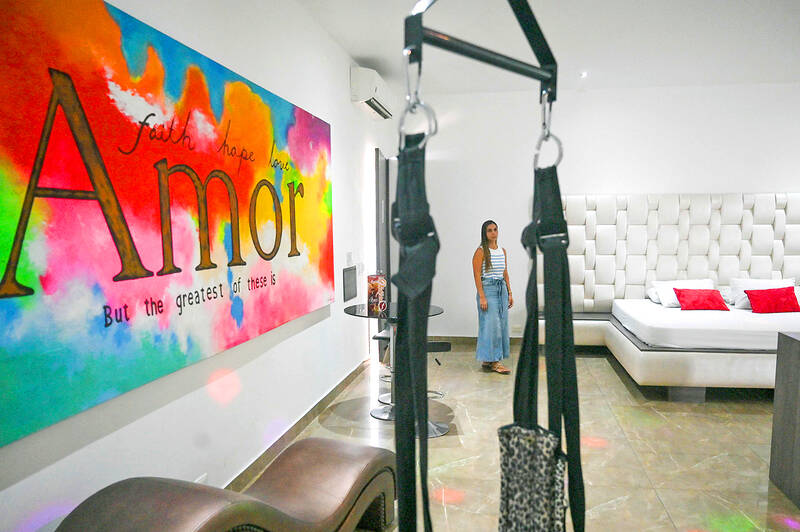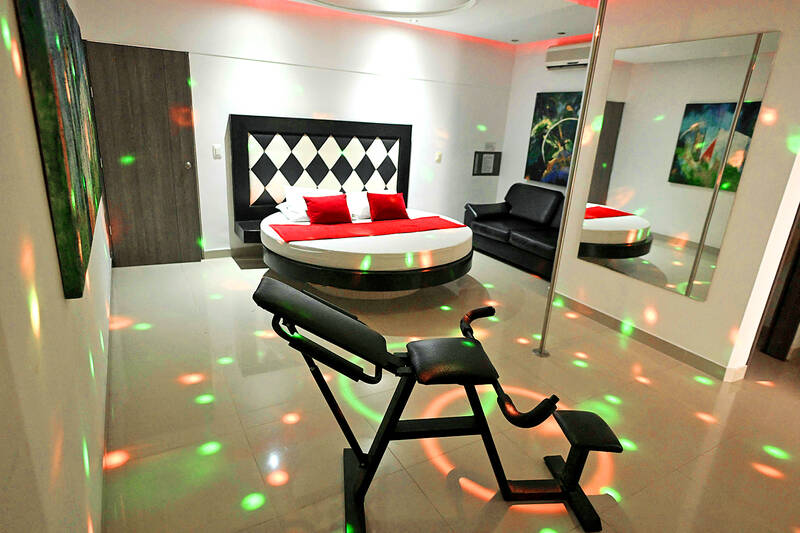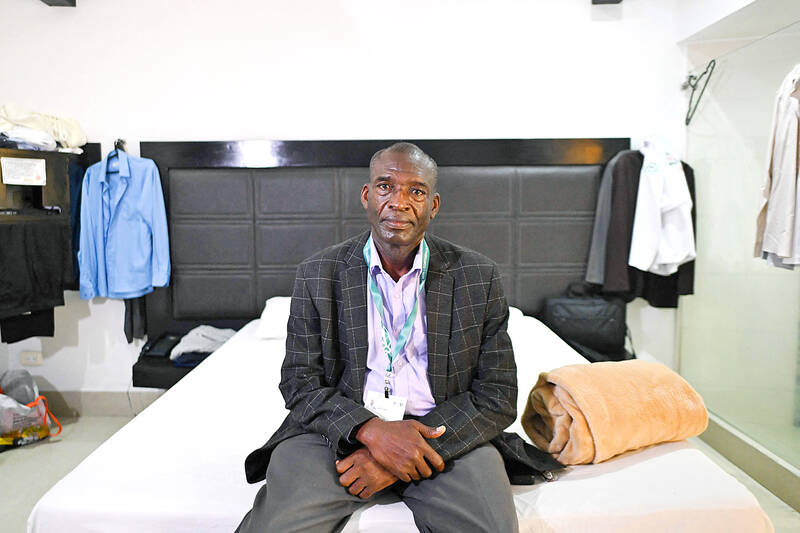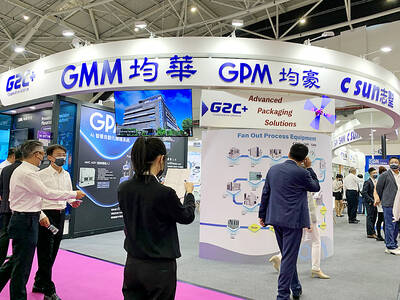Aggrey Rwetsiba, a Ugandan delegate to the UN Biodiversity Conference of the Parties (COP16) to the UN Convention on Biological Diversity in Colombia, finds himself in unusual accommodations: a motel normally destined for trysts, with rooms featuring sex swings and stripper poles.
Like other visitors to the Colombian city, his hotel booking fell through, and Rwetsiba had to make last-minute arrangements.
With traditional hotels bursting at the seams, hourly rate motels came to the rescue of stranded delegates like himself.

Photo: AFP
Showing Agence France-Presse (AFP) around his room in the Motel Deseos (“Desires”), the delegate points to the large double bed, walk-in shower and an unusual feature: a ceiling mirror.
Some of his clothes are draped on hangers from the shower screen, others are folded up in a small cubicle with one door inside the room and another that opens on the hallway.
Usually rented out for a few hours at a time, there are no wardrobes in the rooms. The double-doored cubicle is for staff to pass drinks to guests seeking seclusion.

Photo: AFP
“I’m not sure whether I’ve got the full understanding of what a motel should be, but I have seen some unique features ... like the mirror on the ceiling. I have never seen [that] in a hotel,” Rwetsiba said.
He also pointed to the lone wall socket next to the bed, rather than by the table where he needs to power his laptop.
“So the setup is quite different,” he said. “I have never seen a hotel with each room having a parking yard,” each enclosed, with a private door leading straight into the room.

Photo: AFP
Motel Deseos manager Diana Echeverry proudly showed AFP around the facility, with 40 rooms spread over two floors, and one wing set aside for a dozen COP16 delegates.
In the rest of the building, rooms feature such amenities as whirlpool baths, “Kama Sutra” loungers and dance poles.
“We have adapted our establishment a little in order to be able to host the guests of COP16 and foreigners,” Echeverry said.
Contacted at short notice by local authorities, she said the motel quickly worked out a daily rate — 150,000 pesos (US$34.63) per night — and introduced a breakfast service.
Room prices usually range from 65,000 to 100,000 pesos for three hours.
Staff also “took out the love swings, ‘love machines,’ Kama Sutra chairs and left the rooms without those kinds of items,” Echeverry said.
The biodiversity summit has been good for business, she added.
“It has ensured that the [delegates’] rooms are occupied during those days and ... the remaining rooms now rotate much more to meet the demands of our usual guests.”
Cali Mayor Alejandro Eder told reporters this week the city’s hotels were “100 percent” full, with Airbnbs, houses and apartments also rented out.
Initial expectations had been for 12,000 to 15,000 people to attend the COP16, but in the end, there were closer to 23,000 registered delegates, Eder said.
The Cali Chamber of Commerce said the city has 166 registered motels — more than anywhere else in Colombia.
Like elsewhere in Latin America, motels are generally places go to for a few private hours with a lover.
In Cali, they boast names such as “Kama Sutra,” “Cupido” and “Extasis.” Delighted with the amenities at Motel Deseos, Rwetsiba said he informed other colleagues, and there were now five Ugandan delegates in rooms “more comfortable” than many traditional hotels.
“It’s ... spacious. That’s why we are here. We are not complaining,” he said with a big smile. “We are all happy.”

POWERING UP: PSUs for AI servers made up about 50% of Delta’s total server PSU revenue during the first three quarters of last year, the company said Power supply and electronic components maker Delta Electronics Inc (台達電) reported record-high revenue of NT$161.61 billion (US$5.11 billion) for last quarter and said it remains positive about this quarter. Last quarter’s figure was up 7.6 percent from the previous quarter and 41.51 percent higher than a year earlier, and largely in line with Yuanta Securities Investment Consulting Co’s (元大投顧) forecast of NT$160 billion. Delta’s annual revenue last year rose 31.76 percent year-on-year to NT$554.89 billion, also a record high for the company. Its strong performance reflected continued demand for high-performance power solutions and advanced liquid-cooling products used in artificial intelligence (AI) data centers,

SIZE MATTERS: TSMC started phasing out 8-inch wafer production last year, while Samsung is more aggressively retiring 8-inch capacity, TrendForce said Chipmakers are expected to raise prices of 8-inch wafers by up to 20 percent this year on concern over supply constraints as major contract chipmakers Taiwan Semiconductor Manufacturing Co (TSMC, 台積電) and Samsung Electronics Co gradually retire less advanced wafer capacity, TrendForce Corp (集邦科技) said yesterday. It is the first significant across-the-board price hike since a global semiconductor correction in 2023, the Taipei-based market researcher said in a report. Global 8-inch wafer capacity slid 0.3 percent year-on-year last year, although 8-inch wafer prices still hovered at relatively stable levels throughout the year, TrendForce said. The downward trend is expected to continue this year,

‘BASICALLY A BAN’: Sources said the wording governing H200 imports from officials was severe, but added that the regulations might change if the situation evolves Chinese customs authorities told customs agents this week that Nvidia Corp’s H200 artificial intelligence (AI) chips are not permitted to enter China, three people briefed on the matter said. Chinese government officials also summoned domestic technology companies to meetings on Tuesday, at which they were explicitly instructed not to purchase the chips unless necessary, two of the people and a third source said. “The wording from the officials is so severe that it is basically a ban for now, though this might change in the future should things evolve,” one of the people said. The H200, Nvidia’s second-most powerful AI chip, is one

STRONG SALES: The company said that revenue growth momentum would remain strong this year and next year as major customers continue to buy new equipment Semiconductor equipment supplier Gallant Precision Machining Co (均豪) yesterday reported its best annual profit in 19 years last year, as booming artificial intelligence (AI) chip demand boosted sales of its advanced packaging equipment. Net profit surged about 40 percent to NT$415 million (US$13.12 million), compared with NT$297 million in 2024, the company said in a regulatory filing. Earnings per share rose to NT$2.58 from NT$1.82. Revenue grew 5.18 percent annually to NT$4.67 billion from NT$4.44 billion in 2024. Gallant Precision said revenue growth momentum would remain strong this year and next year as major customers continue to spend heavily on new equipment to boost